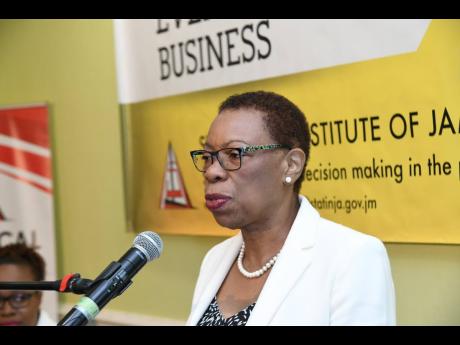New survey negates interest rate as primary barrier to bank loans
Few local businesses in urban centres have ever accessed a business loan or even have internet connectivity, according to new findings from the Jamaica Survey of Establishments conducted by the Statistical Institute of Jamaica (Statin) and published by the Planning Institute of Jamaica, PIOJ.
The survey found that one of 10 establishments have ever accessed a business loan and seven out of 10 establishments do not have internet access.
“How can it be that over 90 per cent of the micro and small businesses are not borrowing money,” said Commerce Minister Audley Shaw at the release of the report on Wednesday, while alluding to another more than decade-old study, which estimated that the informal sector accounted for 40 per cent of total economic output.
“We need to build a more formal economy, because the high level of informality correlates with the levels of access to credit,” Shaw said.
The current study defines an establishment as an enterprise that is situated in a single location that conducts productive activity, either for-profit or not-for-profit. The survey covered establishments that employed a minimum of three persons on a continuous basis.
In the past, high lending rates were blamed for the low take-up of loans, but with interest rates at single-digit levels, other barriers are emerging, such as the requirements to open bank accounts, said PIOJ technocrat James Stewart.
“The relatively low take-up of loans reduces the impact of interest rate policy on economic activity, especially within the context of low interest rates. It is very important from a policy perspective to understand why these businesses are not utilising loans so that measures can be put in place to increase access to financing,” said Stewart, the senior director for the Economic Planning, Research and Policy Logistics Division at the PIOJ.
Stewart said that what seems like a regular requirements to open a business bank account can be seen as barriers to the micro sector, including providing a business registration, articles of incorporation, business tax registration number, identification and TRN for all directors, and letters of good standing. He added that other factors may include improper bookkeeping by establishments and low levels of collateral.
The survey was conducted between July and December 2018 and targeted establishments that employed three or more persons on a continuous basis, as well as doctor, dentist and lawyer offices, irrespective of size. The survey which focused on urban areas excluded agricultural enterprises due in part to their rural prevalence.
Some 17,900 establishments were included in the survey, or 24.5 per cent of all the 72,865 establishments visited by Statin. The majority were either not eligible because they employed less than three persons on a continuous basis – which eliminated about 37,900 establishments – while an additional 17,100 establishments were non-responsive.
The survey found that one-third of the establishments operated in the wholesale and retail trade, another third operated motor vehicle sales or repair services, and just over 11 per cent were accommodation and food services.
Two-thirds of establishments were found to be run by men but most of the employees were women.
Electricity costs trump crime
The greatest challenge relates to the cost of electricity, rather than crime or corruption, which ranked lowest for survey respondents.
Ninety-two per cent of the business surveyed were operated for profit and the remainder were non-profit organisations. Three-quarters of the establishments operated as a single enterprise as opposed to a branch network; five per cent were franchise businesses; and 2.7 per cent were foreign-owned.
Finance Minister Dr Nigel Clarke said at the launch of the survey that wholesale and retail traders needed to become more efficient by employing new technology to increase productivity.
“You go in any community, there’s a shop here, a shop there. The only way we are going to have growth is if those businesses, because of competition, find it necessary to invest in technology to make the provision of their services more efficient,” Clarke said.
The survey of establishments, described as the first of its kind in Jamaica, was conducted with funding from the World Bank, through the Foundations for Competitiveness and Growth Project. The data from the survey will be used as an input for the Statistical Business Register maintained by Statin.
It will provide baseline data on the number and distribution of economic units operating in Jamaica, and arose out of the need for a wider range of business statistics to assess the impact, over time, of government policies, Statin said.
“We want to appeal to those business persons who are averse to giving their data to the institute, it is through your sharing of information that we will be able to provide meaningful statistics that will help to inform not only government policies and programmes, but also the strategic decisions that you make as you seek to grow your businesses,” said Carol Coy, director general of Statin.
Coy again gave the assurance that the data collected in the surveys is protected by law, under the Statistical Act, and is only published in aggregated format.

